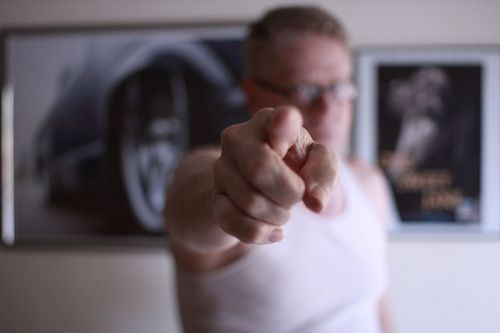The Blame Game: How Your Brain Tries To Fool You Into Pointing Fingers

Why is it so much easier to accept praise for the things you did right than to take blame for what you did wrong? And why is it so reflexive to take credit for success, but when things go awry, immediately turn into a contestant on The Blame Game? The answer, it turns out, may involve time travel.
Not actual time travel, of course. But when a team of researchers measured people’s perceptions after seeing either a negative or positive stimulus, time seemed to pass more slowly following the negative stimulus. Published in the journal Current Biology, the study suggests that blame reduces what scientists call your “sense of agency.”
Participants began the experiment by pressing a key. Each press was followed by positive sounds of achievement or amusement, negative sounds of disgust or fear, or neutral sounds. The researchers then asked subjects to determine when they had pressed the key and when they heard the sound.
A significant portion of subjects reported longer stretches of time between pressing the key and hearing a sound when the sound they heard was negative.
"Our result suggests that people may really experience less responsibility for negative than for positive outcomes," Patrick Haggard, of the Institute of Cognitive Neuroscience at University College London, said in a statement. "This is not merely a retrospective justification about how well we have done: the actual experience that we have changes, even in basic aspects like its timing."
Countless simple acts instill in us a sense of agency. From turning your car key in the ignition on your way to work, to flipping the light switch at night when you’re ready for bed, the sooner an effect takes place after we initiate a cause, generally the more agency we assign to our actions.
Blame is no different, the new study suggests. When you spill someone’s drink or, in a lapse of anger, insult a loved one during a fight, the time it takes your brain to react is greater, say, than if your boss applauds how productive you were last month. This temporal breakdown makes you feel “further” away from the action, and thus, less culpable for its consequences.
One of the obvious drawbacks to a study as simple as keystrokes and sound stimuli is that social interactions are rarely so bare bones. A spilled glass or a harsh word easily back tracks to the source; nonverbal disagreements, rife with poor communication and petty bickering, make assigning blame much thornier. There are many complex, interwoven variables for a person to consider where fault should lie, if anywhere at all.
Where the study seems to succeed is in its treatment of blame’s mechanisms. While understanding why we feel blame has far deeper roots that likely trace back through the millennia of evolution, learning how we come to accept blame allows us to operate with more awareness and, hopefully, patience.
Haggard emphasizes, however, that just because people sense less responsibility, it doesn’t mean they are any less guilty. Plenty of cases have verifiable sources that deserve an accusatory finger pointed in their direction.
"The way we experience agency is not the same as the fact of agency," Haggard said. "We have to take responsibility for what we actually do, not just for how we experience things."
Source: Yoshie M, Haggard P. Negative Emotional Outcomes Attentuate Sense Of Agency over Voluntary Actions. Current Biology. 2013.
Published by Medicaldaily.com



























